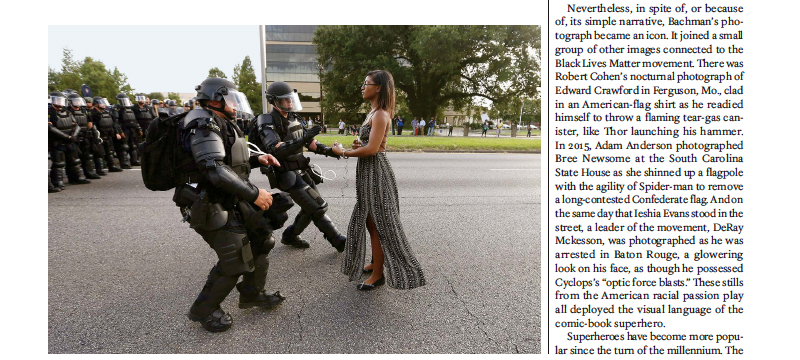Dialogic Reading Journal:
Table of Contents
#1: Handwritten rhetorical analysis of Jamison’s Mark my Words. Maybe.
#2: Reading: NYT , Dyson: “We Forgot What Dr. King Believed In”
- hypothes.is additive, generative, dialogic annotations — add 3-4 — highlight and annotate where your own readerly eye falls — what’s the claim or argument? What kind(s) of support does the writer offer? What’s the rhetorical purpose of the essay — a call to action? To raise awareness? To criticize? To provide perspective? Something else? Notice anything interesting about the structure? What is the writer’s attitude toward us, the readers?
#3: For hypothes.is: “Choosing Animals Over People?” (Kristof, SR 9): https://hyp.is/48CZ-DtTEeiwUVsSHQ3p8w/www.nytimes.com/2018/04/07/opinion/sunday/wildlife-central-african-republic.html
Part 1: For your generative, additive annotations, due before class on Tuesday:
- What’s is Kristof’s real, actual, genuine claim or argument — in your own words?
- How does he support it?
- Does he seem to assume anything about his readers — or what does his attitude toward readers seem to be?
- What questions, concerns, or ideas does the essay raise for you?
Part 2: Then, find an annotation from a classmate and respond to it:
- Can you add to it, in the spirit of additive “social annotations”?
- Can you provide another perspective in response?
- Can you help solve a problem or respond to a question?
#4: Hypothes.is annotation: Course Projects & Policies
#5: Tutorial: How to Search Academic Search Complete (3:08 video) — watch and test-drive video tutorial by applying it to two of your three annotated problems: comment/reflect on both the video tutorial and what kinds of sources you find, especially in terms of the problems’ potential & possible causes: interesting? Not interesting? Helpful? Not helpful? Include some article and article titles; no need to be comprehensive — just some notes are fine.
#6: Your Contextual Analysis: what part(s) are you most looking forward to and about which you feel confident? What part(s) concern or worry you? 250 words +/- (Post-library workshop reflection)
#7: Credibility & “this new informational anarchy” (TBA in class)
“Credibility really is kind of metaphysical: We have to take a little leap of faith to get there. The main root of “credible,” after all, is the Latin word for “belief.” Aristotle thought the best way to inspire such faith was to seem like a good person: “Persuasion is achieved by the speaker’s personal character,” he wrote in “Rhetoric,” “when the speech is so spoken as to make us think him credible.” The audience is inclined to trust someone it already thinks well of.”
— Michelle Dean, NYT Magazine: “It’s Getting Harder to Sort the ‘Credible’ from the Incredible”
The timing of this article is good for us, since you are knee-deep in assessing writers and sources for your Contextual Analysis project. Take Dean’s observation that “credibility really is kind of metaphysical,” and reflect on two of your sources: what is your process for “taking a little leap of faith to get there”? What caused you to decide to vouch for those writers’ — to stand by those writers’ — ethos and credibility?
#8: What have you done in this class so far? What is significant about it?
#9: Reading Response, 5/20 Sunday Review P.1 TBA
#10: Arthur Miller noted that, ““A good newspaper, I suppose, is a nation talking to itself.” If that’s true, what did you “hear” in the NYT over the past 10 weeks? What conversations is our nation having with itself in the pages of the NYT? What patterns did you see? What did you notice?
Or, if you prefer: “The mission of a modern newspaper is to comfort the afflicted and afflict the comfortable.”
